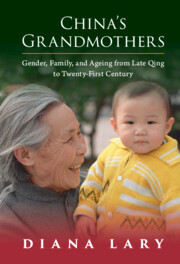Book contents
- China’s Grandmothers
- China’s Grandmothers
- Copyright page
- Dedication
- Contents
- Illustrations
- Tables
- Boxes
- Acknowledgements
- Preface
- Introduction
- 1 Precious Treasures
- 2 Archetypes and Images of Grandmothers
- 3 Baby Seekers/Baby Lovers
- 4 Child Care
- 5 Ruling the Roost
- 6 Old Age
- 7 Grandfathers
- 8 Transmitters of Culture
- 9 Absent Parents
- 10 Left-Behind Children
- 11 The Pleasures of Old Age
- 12 Leaving This Life
- 13 The Future of the Old
- 14 Personal Notes
- Afterword
- Notes
- Bibliography
- Index
12 - Leaving This Life
Published online by Cambridge University Press: 14 April 2022
- China’s Grandmothers
- China’s Grandmothers
- Copyright page
- Dedication
- Contents
- Illustrations
- Tables
- Boxes
- Acknowledgements
- Preface
- Introduction
- 1 Precious Treasures
- 2 Archetypes and Images of Grandmothers
- 3 Baby Seekers/Baby Lovers
- 4 Child Care
- 5 Ruling the Roost
- 6 Old Age
- 7 Grandfathers
- 8 Transmitters of Culture
- 9 Absent Parents
- 10 Left-Behind Children
- 11 The Pleasures of Old Age
- 12 Leaving This Life
- 13 The Future of the Old
- 14 Personal Notes
- Afterword
- Notes
- Bibliography
- Index
Summary
Death has traditionally been regarded in China as something to be prepared for, not as something to be feared, a taboo subject. As age came on grandmothers prepared for their end. If the family did not have a graveyard they arranged a grave site. They had a coffin made, of the most expensive wood they could afford. They ordered a set of grave clothes. The set aside money for the funeral. The division of property was done by customs; wills were not legal documents but moral exhortations to descedents.
In the Mao Era most of these practices were considered feudal and outlawed, in favour of cremation without ceremony. In the Reform Era many have come back, though cremation is encouraged. The dead live on. In the past they joined the ancestors. Now the focus is on commemorating individuals. At the Qingming Festival families remember the dead and provide them with paper replicas of what they may need in the afterlife.
In a breach with tradition, neither of China’s twentieth-century leaders has been buried. Mao Zedong lies in the centre of Tiananmen Square. Chiang Kai-shek is in a coffin in Taoyuan (Taiwan), waiting to be buried in his home town.
- Type
- Chapter
- Information
- China's GrandmothersGender, Family, and Ageing from Late Qing to Twenty-First Century, pp. 185 - 197Publisher: Cambridge University PressPrint publication year: 2022

